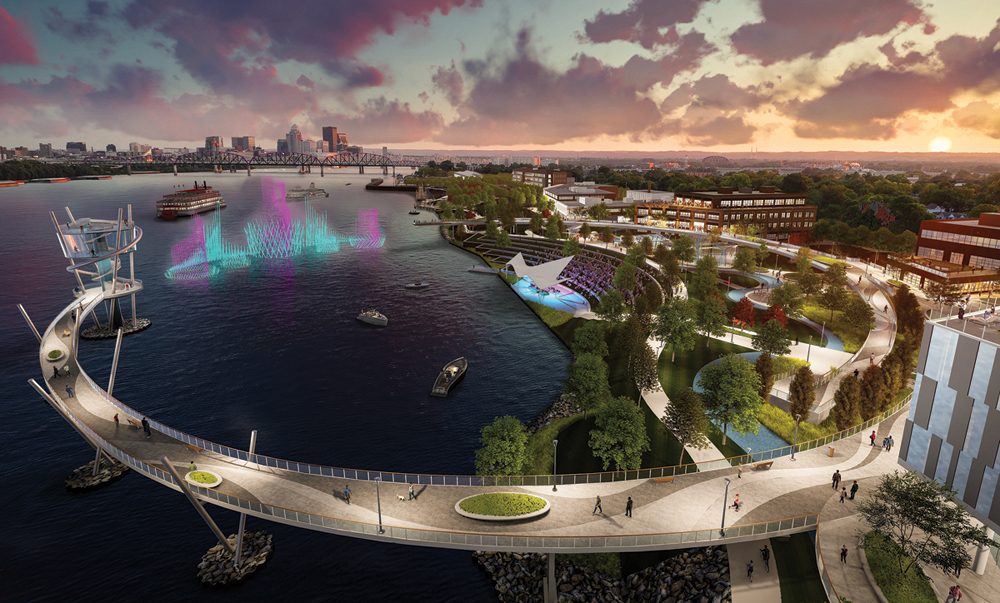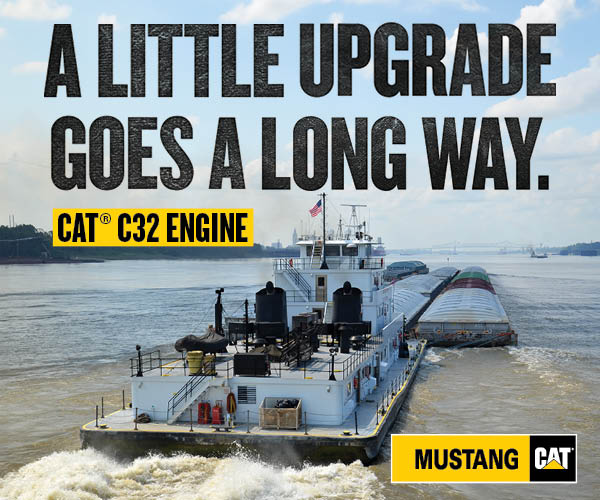American Commercial Barge Line (ACBL) has released potential development plans for the former Jeffboat site along the Ohio River in Jeffersonville, Ind.
Following the results of a study to determine the highest and best use of the property, which included several public meetings to gather input from local stakeholders and neighbors, ACBL, OHM Advisors and The Wheatley Group announced that the study concluded the site is best suited for a mixed-use development to include a cruise ship dock, a 150-slip full-service marina, restaurants, bars, shops, office spaces and living spaces.
“When that fence finally comes down, and there’s a development over there, it’s going to be pretty impactful for the residents that either had parents or grandparents who may have worked there,” said Dylan Fisher, vice president of real estate at The Wheatley Group, which conducted the study on behalf of ACBL.
ACBL owns the 80-acre, 1-mile-long waterfront property on East Market Street, in Jeffersonville. It has been vacant since Jeffboat closed its doors in 2018. The property was once the nation’s largest inland shipyard, originally built as the Howard Shipyard in 1834 before Jeffboat conducted its operations at the site from 1938 to 2018.
The company released conceptual renderings of what the site could look like during a public meeting October 26 at Howard Steamboat Museum’s carriage house. The plans call for preserving and repurposing some historic office buildings and warehouse spaces. The site could also include a hotel, fountains and an amphitheater. ACBL is now looking for a developer interested in making the plans a reality.
One unique aspect of the plans could allow for a riverboat cruise terminal.
“It’s an opportunity to capture the riverboat cruise industry that’s coming along the Ohio River today,” Fisher said. “We have an interest in working with them to put landings here on the site to bring those tourists into the community.”
Phase 1 of the plan calls for roughly $500 million in investment and would bring more than 3,000 jobs to the community. The total estimated price of development is $930 million.
ACBL CEO Mike Ellis recognized the key role Jeffboat has played in Jeffersonville for decades.
“Jeffboat has been an integral part of our community for over a hundred years,” Ellis said. “We’re very excited about this opportunity to revitalize this property.”
George Piccioni, senior director for business development at ACBL, said the designs are the framework for the property and include something for everybody.
“Whether it’s restaurants, entertainment, green space, walkways, offices or living spaces,” he said.
After finding a developer, Piccioni said ACBL would likely spend the next year or two working on permitting, final design and engineering.
“We’re nowhere near done, but we’re a lot further along than we were,” he said.
He anticipated that construction could begin in late 2025 on the first phase of the project.
Jeffersonville Mayor Mike Moore, speaking at the meeting, said there will be a lot of new infrastructure needed to support the project, including sewer lines, sidewalks and roads. He said the city is looking at options, which could include forming a tax increment financing (TIF) district to help pay for those projects. TIF districts allow payroll taxes collected as a result of new development within the district to be used to pay for property improvements.
“Jeffboat has meant a lot to my family over the last 60 years,” Moore said. “It’s the facility that built the city of Jeffersonville, and there’s one way to go, and that’s improving it. The developers and ACBL are fully in on this. The city of Jeff is very enthusiastic about this. The project is going to be unbelievable.”
The city of Jeffersonville, through its Redevelopment Commission, partnered with ACBL in September 2022 and agreed to fund up to $200,000 of the planning costs.




